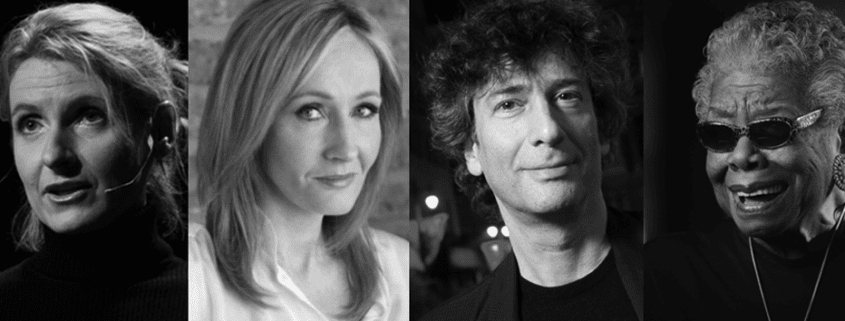Nine Traits of Astonishingly Successful Authors
A Note: This post was originally published in 2017, before JK Rowling’s problematic stances on gender and trans people and before I was aware of how classist and misogynistic some of Stephen King’s opinions are too. Although I want to make it clear that I do not agree with them on these issues, this article is about successful authors and what leads to becoming a successful author. Like it or not, there are still things we can glean from looking at how they got to be so damn successful. So, this post remains.
In a market of ideas, why do some take off while others don’t? Why do some authors have mega status while others continue plodding on in obscurity, or with only moderate success?
The literary market fascinates me. There’s this vast ocean of books, ebooks, audiobooks, etc. published each year and just a handful of them hit it BIG. I won’t pretend to guess that I know the reasons, but thinking about this got me wondering if there are some common traits among bestselling authors.
I think if there was a magic formula we’d know. We’d know because only be those who fit that formula would get books published. But as a writer trying to make it–and by that I mean support myself with my art–I do keep my eyes peeled and my ears open to what seems to set wildly successful authors apart.
Here’s what I’ve learned in the past few years or so in my work with writers, and participating in writing seminars, networking, workshops, and of course, my own research.
To be sure, this kind of mind-blowing commercial success–I’m talking JK Rowling, John Grisham, Elizabeth Gilbert level–is not likely to just happen to most of us, but it can’t hurt to know what these authors have in common.
So, let’s dive in, shall we?
#1 They write a lot.
And often they have been for a while. One of the big fallacies that I wish that some successful people would stop perpetuating is the idea that they just tried something and it worked. Sure there are those lucky ducks who get rich quick. I’m not saying luck never has anything to do with it.
But read enough success stories, or listen to enough podcasts like How I Built This or Being Boss and you’ll notice a pattern, namely that successful people worked really hard for their success. Whether it is practice, trial and error, or getting a degree, more often than not, it takes time and commitment.
There’s a reason they say “building” a reputation and not “sprouting” a reputation.
Neil Gaiman offers this advice,
“Something that worked for me was imagining that where I wanted to be – an author, primarily of fiction, making good books, making good comics and supporting myself through my words – was a mountain. A distant mountain. My goal.
And I knew that as long as I kept walking towards the mountain I would be all right. And when I truly was not sure what to do, I could stop, and think about whether it was taking me towards or away from the mountain. I said no to editorial jobs on magazines, proper jobs that would have paid proper money because I knew that, attractive though they were, for me they would have been walking away from the mountain. And if those job offers had come along earlier I might have taken them, because they still would have been closer to the mountain than I was at the time.”
(Here’s his full commencement address at The University of the Arts: http://www.uarts.edu/neil-gaiman-keynote-address-2012)
But before you go quitting your job, please read on.
#2 They submit/pitch a lot and are in it for the long game.
One of the stories that has encouraged me the most is Elizabeth Gilbert’s Ted Talk where she shares how she submitted her writing to publications for almost SIX YEARS before getting something published. That’s a long fucking time to wait. And that’s real commitment.
#3 They believed in their project(s).
We’ve all heard certain authors say that they didn’t think anyone would actually publish their work. This is one of those moments where I wonder if their hindsight is really 20/20.
Who writes for so long and submits proposal after proposal if they think they have absolutely no hope?
It’s likely best not to have expectations, but I have a hunch that they believed someone would say yes, eventually.
When asked about her faith in her first Harry Potter book, before it was published, J K Rowling said, “You know, I can say this now, I was quite diffident about saying it for a long time. But I did have a belief, with Harry, that the difficult thing would be persuading someone to take it, because it didn’t fit. People said children’s books had to be half the length, and what an old-fashioned subject, a boarding school. I did have this feeling that the difficult thing would be persuading someone to publish it – but that if it was, people would like it.”
(Read the full interview here: https://www.theguardian.com/books/2015/nov/28/conversation-lauren-laverne-jk-rowling-interview )
#4 They stood for something. Often something different/unique.
These famous authors have instant recognition in our minds. We know them for their style, their voice, their subject matter, or persona of writing. I think a big reason many authors don’t get there is because they aren’t deeply rooted in who they are, what they offer, what/who they stand for, or what they seek to understand. In other words, they don’t know what their brand is.
This, of course, is of utmost importance in the stories we write as well. Depth of plot and character, as well as an intimate knowledge of themes and what both you and your writing is about, is key.
#5 They are as tenacious as fuck.
They made time for their writing, they got agents, they created book proposals, they wrote essays, or stories, or whatever. The point is, they didn’t make excuses for finding the time to finish their work. They did the work.
#6 They are focused.
Maybe this one could be combined with the point just above, but I want to emphasize it. Perhaps because I need to remind myself of this so often. I love ideas, always have. But the problem is, I find myself jumping on too many of them and doing way too many disparate things, which makes me fall behind on finishing the things I’ve already started.
“Just write every day of your life. Read intensely. Then see what happens. Most of my friends who are put on that diet have very pleasant careers.” –Ray Bradbury
What is clear is that all of these fabulously successful writers carve out time to write, consistently. They make it a priority.
#7 Most of them had day jobs, so there’s no excuse.
JK Rowling was a single mom with a low-paying job who was on state assistance while she wrote the first Harry Potter book. I try to remind myself of this when I’d rather be working out a storyline than getting my other/paid work done.
Besides, I think writing in a vacuum often produces navel-gazing, academic, philosophic work, whereas having other obligations while writing, however you do it (doesn’t have to be a day job), produces richer writing and more interesting work.
Here’s what Maya Angelou said, in an interview with Harvard Business Review:
Interviewer: “When you were working at those early jobs, did you ever envision what you would become?”
Maya:
“No, but I didn’t think I wouldn’t. I somehow got the feeling early on that if human beings did a thing, I could study it and try to do some of it too. And one thing led to another. If I had not studied Latin in school, I wouldn’t have found it as easy to comprehend the structure of language. Had I not danced, I might never have really listened to music and known I could compose something. You see? I understood early that not everything I did wasn’t going to be a masterpiece, but I would try to do it the best I knew how. I’ve listened to an inner voice and had enough courage to try unknown things. And I think everything in its time.”
And that brings us to what I think is one of the most important points of success.
#8 They had really great ideas/stories that were usually well executed.
It seems to me that more often than not their stories or ideas were not only great, but were well crafted. How many times have you read a book, seen a movie, or watched a TV show and thought, well it was a good premise, but it lacked [fill in the blank]? These BIG successful books, essays, screenplays, etc. are (with definite exceptions) excellent ideas, well played.
I think we often underestimate the power of great ideas.
#9 They often felt a higher calling to write.
One more quote from Maya Angelou, to sum this point up:
“You can only become truly accomplished at something you love. Don’t make money your goal. Instead, pursue the things you love doing and then do them so well that people can’t take their eyes off of you.”
Whether you or I ever get to the top of our mountains, I think Ms. Angelou’s advice is always good. If you love what you’re doing, even if you’re making your money elsewhere, you’ll enjoy this life more anyway.
Here’s hoping that someday, your name will be in lights. Or at least that you get to do more of what you love.



